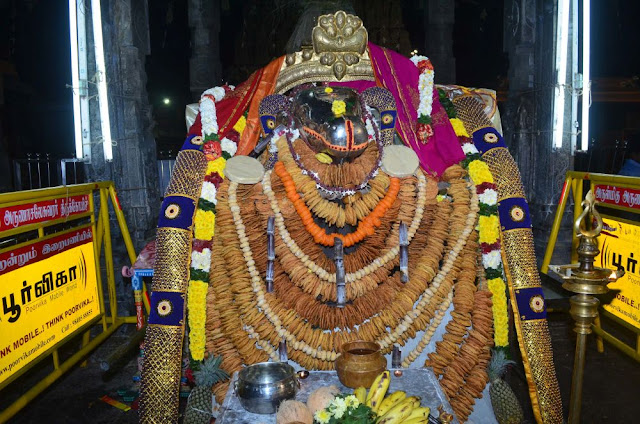From the early hours Abishekam is performed at the Temple, in order to ensure the start of the procession by 5 a.m. At which time iconic representations of the Lord (and Parvati) is carried by attendants on a palanquin with a huge sunshade.
After Blessing the Nandhis enroute the Holy Couple find their way out through the thitti vaasal - a small entry at the east of the Temple compound, instead of leaving through the main Temple gate known as the Raja Gopuram.
 |
| Lord Arunachaleswarar gives darshan to the Sun |
 |
| The Goddess in front of the Thitti Vassal Gate |
On blessing the Sun at the thitti vaasal the procession goes around the temple perimeter thrice.
The third day of this Festival is known as Mattu Pongal and is meant to offer thanks to cows and buffaloes, as they are used to plough the lands.
A legend associated with the Festival and particularly connected with Mattu Pongal goes like this.
The Banishment of Basava
The third day of Pongal known as Mattu Pongal involves Lord Shiva and his mount, Nandi (Basava), the bull. According to legend, Lord Shiva once asked the bull to go to Earth and deliver this message: "have an oil massage, bathe daily and eat food once a month". Basava mixed up the message, and mistakenly told the people; "have an oil massage, bathe once a month and eat food daily". Enraged Shiva cursed Basava and said that due to his mistake there would be shortage of grains on Earth. He banished the bull to live on Earth forever in the form of cattle and help people plough the fields.
Thus, Mattu Pongal has an association with cattle. As well as farmers and agriculturalists celebrating Mattu Pongal, the cow (buffalo) is also worshipped at Arunachaleswarar Temple.
The Five Nandis
During Mattu Pongal at Arunachaleswarar Temple, apart from other celebrations, the five Nandis (and Adhikara Nandi) inside the Temple are lavishly decorated with garlands and foodstuff.
The Five Nandis:
Pradosha Nandi in Moolastanam
Ratha Vilaku Nandi in Second Prakaram
Kodi Kampathu Nandi in Third Prakaram
Chinna Nandi in Fourth Prakaram








